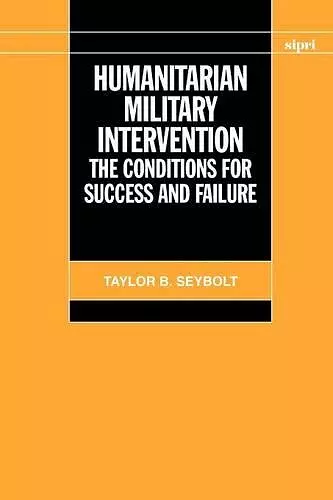Humanitarian Military Intervention
The Conditions for Success and Failure
Format:Paperback
Publisher:Oxford University Press
Published:10th Jul '08
Currently unavailable, and unfortunately no date known when it will be back

Military intervention in a conflict without a reasonable prospect of success is unjustifiable, especially when it is done in the name of humanity. Couched in the debate on the responsibility to protect civilians from violence and drawing on traditional 'just war' principles, the central premise of this book is that humanitarian military intervention can be justified as a policy option only if decision makers can be reasonably sure that intervention will do more good than harm. This book asks, 'Have past humanitarian military interventions been successful?' It defines success as saving lives and sets out a methodology for estimating the number of lives saved by a particular military intervention. Analysis of 17 military operations in six conflict areas that were the defining cases of the 1990s-northern Iraq after the Gulf War, Somalia, Bosnia and Herzegovina, Rwanda, Kosovo and East Timor-shows that the majority were successful by this measure. In every conflict studied, however, some military interventions succeeded while others failed, raising the question, 'Why have some past interventions been more successful than others?' This book argues that the central factors determining whether a humanitarian intervention succeeds are the objectives of the intervention and the military strategy employed by the intervening states. Four types of humanitarian military intervention are offered: helping to deliver emergency aid, protecting aid operations, saving the victims of violence and defeating the perpetrators of violence. The focus on strategy within these four types allows an exploration of the political and military dimensions of humanitarian intervention and highlights the advantages and disadvantages of each of the four types. Humanitarian military intervention is controversial. Scepticism is always in order about the need to use military force because the consequences can be so dire. Yet it has become equally controversial not to intervene when a government subjects its citizens to massive violation of their basic human rights. This book recognizes the limits of humanitarian intervention but does not shy away from suggesting how military force can save lives in extreme circumstances.
Seybolt presents a quantitative analysis drawing lessons from seventeen interventions...Seybolt's explanation of his methodology is impressive. * Aidan Hehir, Political Studies Review *
Review from previous edition Seybolt rejects the majority of abstract, philosphical literature on the subject, to focus on real problems, faced by real practitioners both in theatre and in the halls of power. Military intervention in the name of humanity will remain a central policy challenge in the near future, and Seybolt's work succeeds in providing valuable new insights for practitioners at both ends of the spectrum. [The] Interesting case studies are well researched and a pleasure to read.' * Matthew Taylor, consultant in NATO's Public Diplomacy Division *
ISBN: 9780199551057
Dimensions: 235mm x 155mm x 14mm
Weight: 541g
312 pages